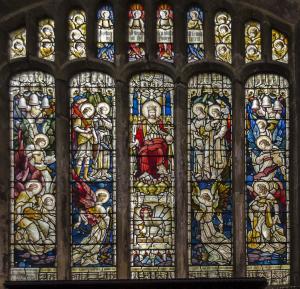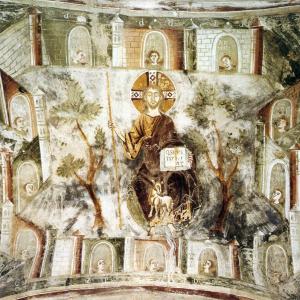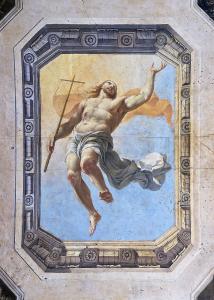 We conclude today our six-week foray into the enigmatic, and endlessly fascinating, Revelation of St. John the Divine, to give its lengthy official title. As I have already stated, there are very few reputable scholars who still argue that any known author named John, most especially the writer of the fourth Gospel, actually penned this book. This John is sui generis, steeped in the Greek Old Testament, fully acquainted with the various number and letter games of apocalyptic literature, ever ready to play with the familiar images of the books of Daniel and Ezekiel in particular to make his vaunted claims for the universal power of God and Jesus the Lamb of God, at the same time denigrating the so-called power of Rome which is about to fall. Whoever he was, his book has fed the curiosity and wonder of readers for two millennia, creating fear in many along with the source of vast wealth and notoriety for others. These latter mountebanks are well-known figures, flying about the world in their luxury jets, using the language of Revelation in ways that dupe the anxious and mislead those hungry for the truth of the scripture. Their shameless acts of so-called teaching/preaching are lamentable and horrifying, and they should be called out as the hucksters that they are, for Revelation is not a road map for the end of the world, a guide that leads certain believers to heaven and dooms other believers to Hell. As I have tried to say, it is a rich statement of God’s real authority in the cosmos, and an equally rich statement against any earthly powers that claim otherwise. God is winning and wins, says John, and others who claim that they are winning are rejected and doomed to fall under the power of God.
We conclude today our six-week foray into the enigmatic, and endlessly fascinating, Revelation of St. John the Divine, to give its lengthy official title. As I have already stated, there are very few reputable scholars who still argue that any known author named John, most especially the writer of the fourth Gospel, actually penned this book. This John is sui generis, steeped in the Greek Old Testament, fully acquainted with the various number and letter games of apocalyptic literature, ever ready to play with the familiar images of the books of Daniel and Ezekiel in particular to make his vaunted claims for the universal power of God and Jesus the Lamb of God, at the same time denigrating the so-called power of Rome which is about to fall. Whoever he was, his book has fed the curiosity and wonder of readers for two millennia, creating fear in many along with the source of vast wealth and notoriety for others. These latter mountebanks are well-known figures, flying about the world in their luxury jets, using the language of Revelation in ways that dupe the anxious and mislead those hungry for the truth of the scripture. Their shameless acts of so-called teaching/preaching are lamentable and horrifying, and they should be called out as the hucksters that they are, for Revelation is not a road map for the end of the world, a guide that leads certain believers to heaven and dooms other believers to Hell. As I have tried to say, it is a rich statement of God’s real authority in the cosmos, and an equally rich statement against any earthly powers that claim otherwise. God is winning and wins, says John, and others who claim that they are winning are rejected and doomed to fall under the power of God.
The glorious end of the book that we see today reinforces those claims and concludes on a spectacular note of splendor and hope. The vision that John now witnesses is unparalleled in grandeur and exaltation. “In the spirit, (one of the seven angels) carried me away to a great high mountain and showed me the holy city Jerusalem (always) coming down out of heaven from God” (rev.21:10). In the previous verse, the angel has promised John that he will now see “the bride, the wife of the Lamb.” This bride is apparently Jerusalem, but of course this is not the earthly city with that name, but rather the heavenly Jerusalem that earlier parts of the book have demonstrated is God’s consecrated and perfect place that serves as a perpetual model for all cities and all peoples on earth. Babylon (Rome) is doomed to fall, while the heavenly Jerusalem is and will always be preeminent on earth.
The fact that this Jerusalem is hardly the earthly city, known as the place where the Lamb was slain, is made clear in 21:22: “I saw no temple in the city, for its temple is the Lord God the Almighty and the Lamb.” The temple of Jerusalem, that symbol of religious power and authority in Judaism, is no longer needed, because God and the Lamb will now play the roles that the Temple had fulfilled. What that appears to mean is that traditional religious power, manifested in a temple and practiced by priests and others designated for such authority, is now to be exacted by God directly. That is, temples can be corrupted, along with those who work in them, but that is not the future of God’s people. Now, as it should have been from the beginning, God and the Lamb will lead; there is now no need of intermediaries.
And this divine leadership is so pervasive that “the city has no need of sun or moon to shine on it, for the glory of God is its light, and the kings of the earth will bring their glory into it” (Rev.21:23-24) . Here is an important verse, suggesting two crucial ideas for John. First, the sun and the moon, those “lights of the sky” from Gen.1 need no longer separate day from night, their designated role at the very beginning of creation, because God and the Lamb will now serve as lights for all. I must repeat at this point that John is not talking about some fantastic end of time scene, after we all have died. The world in which we now live may become one in which God is the only light we need, since the heavenly Jerusalem is always in the process of descending from heaven, showing us the ways our community should be shaped, in the light of God.
The second idea from 21:24 is that “the kings of the earth will bring their glory into the city.” That means that the kings, who have been labeled in several places in the Revelation as would-be powers over against the power of God and the Lamb, will themselves ultimately find their way into the vast heavenly city and will willingly bring their glory, their earthly power, into the city, bidding it be transformed by the light of God. Even the kings of earth will be included in the vast city of God and the Lamb. Despite earlier indications in the book that earthly kings will be destroyed by the warrior Lamb, as I have already stated the warrior Lamb is transformed by the slain Lamb in Rev.5. The kings of earth will be invited into God’s city and will subsume their glory into the blinding light of God and the Lamb.
“Its gates will never be shut by day—and there will be no night there. People will bring into it the glory and the honor of the nations” (Rev.21:25-26). Unlike every other city on earth, where night always requires the shutting of its gates to protect it from thieves and enemy armies, the city of God has no need of such protection, since there is there no night, but only the great and continuous light of God. And also, John repeats, that the people will add their own glory and honor to that of the kings, as the heavenly city fills its vast spaces with all manner of earth’s people, from king to pauper. But make no mistake, “Nothing unclean will enter, nor anyone who practices abomination or falsehood, but only those who are written in the Lamb’s book of life” (Rev.21:27). The choice of what is banished from the city is instructive, and at the same time a bit confusing. What exactly is judged “unclean”? Is this a reference to the Levitical code; is John taking up the intricacies of dietary law and practice? That seems unlikely, since no other place in his book speaks of such matters. I would suggest for John that “unclean” is a general designation for what he immediately calls “abomination and falsehood.” In the city of God, abomination, most specifically idolatries of various varieties, and the falsehoods that arise from idolatry, are strictly rejected. Thus, all kings and peoples who enter the city of God must leave their idolatry and falsehoods behind. Roman idolatry, particularly the emperor cults of their worship, and their false claims to absolute power, are not to be seen in the city of God, as John has been saying from the very beginning of his visionary book.
And then John witnesses something quite extraordinary. The angel shows to him “the river of the water of life (surely an echo of the river that flows out of the Temple in Ezekiel 47) flowing from the throne of God and of the Lamb (there being no Temple here). This life-giving river is reminiscent of any number of biblical places where water has served as a gateway to life: from the waters of creation in Genesis, to the waters of the Sea of Reeds in Exodus, to the waters of the Jordan, leading to the land of promise, to the waters of baptism that lead John’s community to life with God and the Lamb. Yet, not only is the river one of life, but on “either side of the river is the tree of life with its twelve kinds of fruit, producing its fruit each month, and the leaves of the tree are for the healing of the nations” (Rev.22:1-2). Here John rings wonderful changes on stories from Genesis 3. The tree of life in the older tale led to an expulsion from the garden of God, but here the fruit is life giving. And in the earlier Genesis narrative, the man and the woman attempted to use fig leaves to cover their nakedness, but here the leaves are not instruments of hiding and deceit, but are instead for the healing of the nations. In effect, John turns the Genesis story upside down; in the city of God, all is redeemed, all made new.
The vision ends with “nothing accursed” in the city, while all the servants will worship God, seeing directly God’s face, with God’s name imprinted on their foreheads (Rev.22:3-4). God’s name will be printed there, not the number and mark of the beast as John warned in Rev.13. Again John says that “there will be no more night; they need no light of lamp or sun, for the Lord God will be their light, and they will reign forever and ever” (Rev22:5).
John thus presents to us competing ways of seeing the world; does Rome rule or does God? Are we children of our government or children of God? Is any earthly power worthy of our worship or only God and the Lamb? As John offered this choice in the first century to those who would be followers of God, so John offers that same choice to us. Which will we choose?
(images from Wikimedia Commons)











